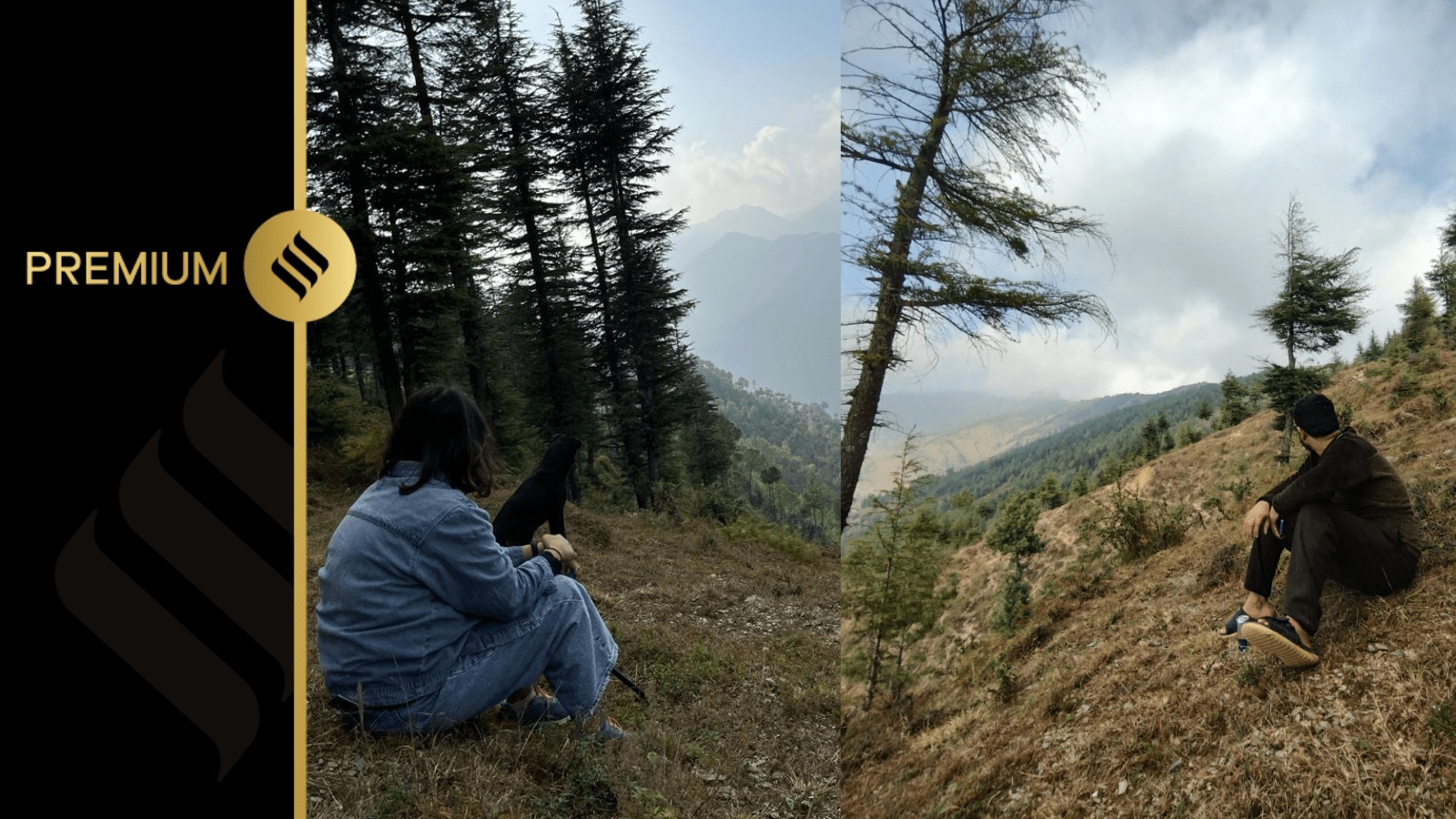It’s 10 pm, and in a two-bedroom house in Haldwani, a couple in their late 20s is getting ready to take their pets for a walk before calling it a day. “People assume we are married because we raise dogs,” she says as she steps out. “We don’t correct them,” the man adds.
On the face of it, nothing distinguishes these two from the many couples that live around them. Except one thing: they are an unmarried non-binary couple that are the one of three couples challenging Uttarakhand’s Uniform Civil Code.

Aimed at regulating aspects such as marriage, divorce, inheritance, adoption, and property succession, the Uniform Civil Code of Uttarakhand Act, 2024 was passed in February last year, with the rules under it coming into effect this January. According to the government, the rules were meant to codify a disparate set of personal laws that govern these aspects.
However, critics — including the petitioners – argue that the law, which mandates the registration of live-in relationships in the state, is a breach of privacy and opens vulnerable couples to unwarranted scrutiny — even putting them at risk of violence.
The couple – both researchers with a background in media studies — belong to the same caste and religion, and don’t have the same challenges as some interfaith couples. However, their relationship came with its own set of challenges, such as intrusive questions about the relationship, taunts and even threats from family members for their refusal to marry, and fear that the law could compound their troubles.
“I don’t identify as a cis woman,” she says. “Earlier, there were apprehensions about us being the first couple to stand up against the state, and my parents warned me that it might not go down well. But by then, it was too late to pull back.”
While arguing on their behalf in the Uttarakhand High Court, senior advocate Vrinda Grover highlighted their reservations in court. In their petition, the couple object to the mandatory registration of live-in relationships, saying that the “…the requirement to register under the heteronormative framework of the UCC Act, 2024, and the UCC Rules, 2025 issued thereunder compels her to affirm to a heterosexual identity. Additionally, the couple’s lived experiences with unhappy marriages and domestic violence in their natal families have reinforced their belief in choosing a relationship based on mutual respect and autonomy rather than conforming to institutionalised structures”.
Story continues below this ad
‘Thought it was a gimmick’
While the man is from Uttarakhand, his partner is from Delhi. Both hold a master’s degree in law, politics, and society from Ambedkar University, Delhi. He lost his parents in 2021, while he was still pursuing a PG diploma in journalism in 2021. Meanwhile, her West Bengal-based parents are aware of the relationship.
When it was first made public, one provision stood out in the Uniform Civil Code of Uttarakhand Act, 2024 – it would govern live-in relationships, which otherwise would have come under the Domestic Violence Act.
The law requires all live-in couples to register, prescribing a marriage registration-like procedure for this. It also requires couples to produce a registration certificate while taking homes on rent.
While shocked at the announcement, the couple didn’t believe that the rules under the law, which were rolled out in February, would ever be framed. “We thought it was just a gimmick,” the man says.
Story continues below this ad
They began dating in 2022 –1.5 years after they parted ways in college. They were both looking for an accommodation in Delhi and decided to move into a flat together.
“I was working in Delhi and he had just left his job in Dehradun. Initially, we were cohabiting in a flat but weren’t in a relationship. Later, we agreed that if things don’t work out between us, we would continue to live as flatmates,” she says, sipping on iced coffee.
Their lives took a tumultuous turn in 2023, when she was attacked by the man’s friend and sustained third-degree burns on her chest and back. Having little money to spare after medical expenses, the couple made a difficult decision – moving to the man’s home in Haldwani. The house had stood empty since his parents died, and with both of his siblings living outside – a brother abroad and a sister in Delhi – it seemed like the ideal choice.
But soon, things began to go downhill.
 His family’s discomfort with the idea of a live-in relationship combined with the couple’s chafing against what they saw as rigid structures led to open hostilities – even threats.
His family’s discomfort with the idea of a live-in relationship combined with the couple’s chafing against what they saw as rigid structures led to open hostilities – even threats.
“In September 2024, his brother threatened to murder me, and we decided to move out,” she says.
Story continues below this ad
Apprehensions
This was around the time when details of what the UCC rules would be had begun to emerge, prompting social outfits such as women’s rights organisations to hold protests. The situation prompted the couple to begin engaging with social and political outfits about some shared concerns.
In December, senior advocate Vrinda Grover overheard the couple jokingly say at a meeting in Nainital that they would be willingly to file a court petition and eventually approached them.
“Just before the rules came out this February, Vrinda Grover, who was drafting a Public Interest Litigation (PIL) for Mahila Manch, asked us if we wanted to approach the court too. We didn’t think too much about it and agreed,” she says.
Their petition, which attached a news report of The Indian Express about the harassment and interference faced by couples even before the enforcement of the UCC, says that the law has “intensified concerns of coercion and unwanted intrusion into their right to cohabit together”.
Story continues below this ad
“What is also exacerbating the fear and anxiety of the couple is the imminent threat of punitive criminal sanctions, including jail time, under the UCC Act, 2024. These penalties will take effect from February 27, 2025 — one month after the appointed date of January 27, 2025—and will apply to any couple in Uttarakhand engaged in a live-in relationship who have failed to register as required under Section 381(1) of the UCC Act, 2024,” the petition says, instead asking the court to order that no coercive action should be taken for non-registration of live-in relationships.
After filing their petition, the couple began to fear possible attack from right-wing outfits. These were compounded when one of their counsels asked them to reconsider their decision.
“He said the petition has our names and we will be scrutinised by the state. But Vrinda asked us not to backtrack,” the man says.
While hearing their petition in court on February 28, the Uttarakhand HC said those who felt persecuted under the law were free to approach the court and asked the state if it could consider changes to the legislation. This line was vastly different from the one the court took 10 days before, when it told another petitioner couple: “…you are brazenly living together without there being a marriage… What is the privacy that is being invaded?”
Story continues below this ad
Despite this perceived softening of stance, the couple is prepared for an adverse ruling. Asked if they would register should they lose, she dithers, saying: “We don’t know. We have expenses, what with the dogs and my medicines, and we don’t have the money to move out”.
But her partner remains firm. “How many have access to Vrinda Grover? It (the case) was put on a platter for us. I’m a pahari, and I won’t be an outcast here. We have nothing to lose,” he says determinedly.



 His family’s discomfort with the idea of a live-in relationship combined with the couple’s chafing against what they saw as rigid structures led to open hostilities – even threats.
His family’s discomfort with the idea of a live-in relationship combined with the couple’s chafing against what they saw as rigid structures led to open hostilities – even threats.





























